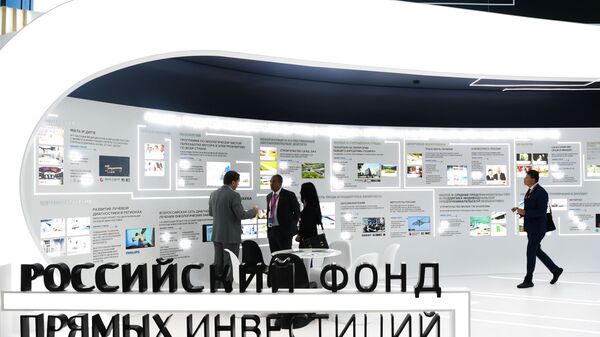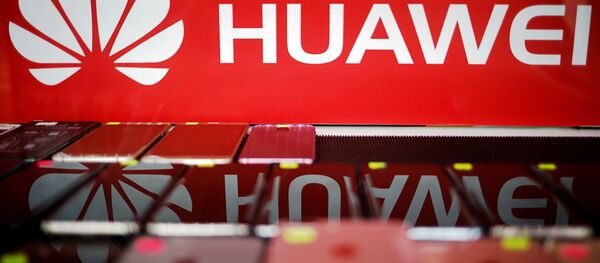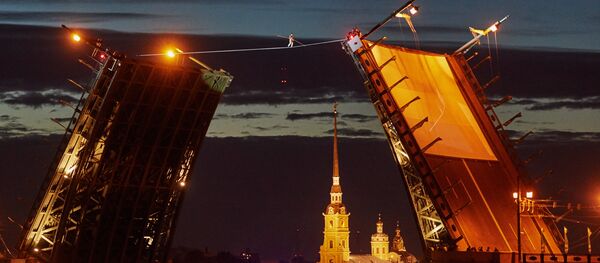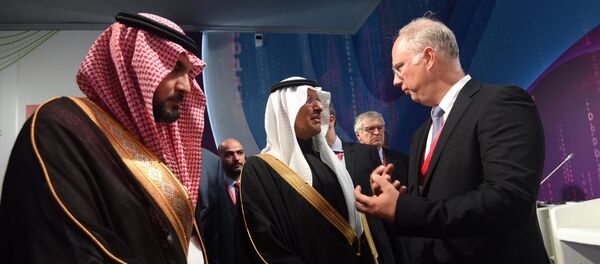The head of the Russian Direct Investment Fund (RDIF) Kirill Dmitriev has spoken about national projects, investments in various projects, the effect from economic sanctions and gives his forecasts and predictions for the upcoming year.
Sputnik: What are the key results of RDIF in 2019? How much money did you invest with your partners? Investors from which parts of the world were the most active?
Kirill Dmitriev: The Russian Direct Investment Fund had another active year in 2019. Together with our partners we have invested over 305 billion roubles in various projects in Russia. The fund invested 25 billion roubles, while 280 billion roubles were invested by our partners.
We invested in such sectors as infrastructure, technology, including aritifical intelligence, finance, biotech, agriculture, healthcare, logistics, petrochemicals, utilities, and municipal services. Some deals are still being finalised, so by the end of the year the total amount will be even higher.
At the start of this year, I forecasted that foreign direct investment in Russia would increase by over 50 percent this year; many had raised questions about this figure. Now we see that by the end of this year FDI will grow by around 70 percent. It is very significant growth.
And we see that the fund’s co-investment model showed resilience and efficiency. RDIF is the key institution in Russia responsible for attracting foreign investment. Many other countries like France, Italy, Turkey, India, Armenia, Mongolia, and Kyrgyzstan have created funds, replicating RDIF’s model in order to attract foreign investment.
This year we also saw resumed interest from our key European partners: France, Italy, Germany as well as other European countries.
Just at the end of the year, we announced our first deal with a company from Spain. Together with Urbaser, Spain’s leading municipal solid waste (MSW) management company, and Russia’s Sibinveststroy, we will invest almost 3 billion roubles to build a waste processing facility in the Kaliningrad Region.
This project is part of waste management sector reform in Russia, which started this year. As a result of this reform a modern waste processing industry will be created in Russia, nearly from scratch. Thanks to this project, the Kaliningrad Region, with a population of over 660 000 people, will be a pioneer in this reform.
The facility will process up to 70 percent of all the waste in the region, which will improve the region's environment. The processed waste including glass, metal, and plastic will be re-used in the region’s enterprises. Waste recycling in line with the best international practices is one of the government's priorities and will remain RDIF’s investment focus in the future.
Sputnik: Apart from the just announced deal with Spain’s Urbaser, what other deals demonstrated this resumed interest from European investors?
Kirill Dmitriev: Investors from France, Germany, and Italy have been particularly active. Together with the global leader in rehabilitation and care for elderly people, French company Orpea, we will build a network of elderly care and rehabilitation centres in Russia. It is a very important investment.
By 2030, when the average life expectancy in Russia will reach 80 years, the share of people older than 80 will reach 30 percent. In order to provide world-class medical care for our mothers and fathers when they need it will require investment and expertise.
Our agreement with Orpea is a major step towards a radical change in this sector. An efficient business model will allow the company to offer high-quality services for our elderly people at affordable prices, reducing the burden on the state budget. Orpea is a global leader, and its expertise will help to bring positive changes to this important sector in Russia.
Other projects with our French partners include investment in a water management system in Tomsk with Veolia, in a manufacturer of smart equipment for electrical grids in Samara as well as a project to improve energy efficiency of Russian enterprises with Dalkia.
Our venture with the leading German wholesale-retailer Metro Cash & Carry will help Russian independent entrepreneurs to open over 300 retail stores on very attractive financial terms with the franchise from Metro. This project is a very practical step to support Russia’s small businesses.
Together with German investment group KGAL we announced new investments in the creation of an aircraft leasing company as well as investments in Cotton Way, the leading operator in handling textiles for hospitals and hotels. We partnered with such a well-known German brands as Porsche to invest in the leading developer of additional reality displays for cars WayRay.
Sputnik: What was the impact from sanctions?
Kirill Dmitriev: Economic sanctions are an outdated instrument that contradicts the logic of the development of the global economy. Nevertheless, global capital still needs opportunities for investment and the flow of global capital is impossible to stop.
Sanctions can also be harmful for those who initiated them. In the last year and a half, the amount of dollar transactions in the SWIFT international payment system fell by 5 percent. The anti-Russian sanctions are not working the way their authors want them to work while normal dialogue between the countries has been disrupted.
At the same time, despite geopolitics there is no isolation. In 2018, the United States topped the list of investors ranked by a number of investment projects in Russia. Germany came second. During Donald Trump’s presidency Russia-US trade has grown by one third.
Also we see that the rouble has appreciated by over 12 percent to the US dollar, the highest appreciation rate among emerging market currencies.
Russian industry has received a strong competitive advantage, both in domestic and export markets. The share of imported equipment fell to 24 percent from 36 percent, while the share of non-oil exports has grown from 33 percent to 43 percent.
This year Russia has successfully boosted the share of the rouble in its foreign trade, which contributed to the strengthening of the national currency. The share of the rouble in foreign trade transactions has risen five-fold to 14 percent since 2014.
During the same period, the share of the dollar fell by almost two-fold, from 92 percent in 2014 to 50 percent by mid-2019. We expect this “dedollarisation” trend to continue globally.
Sputnik: According to Italian company Anas CFO Edoardo Eminyan, Russia is a key market for the company. Overall, how active are Italian investors?
Kirill Dmitriev: Our cooperation with Italian companies is going well. “Made in Italy” products are gaining popularity in Russia, especially food and designer clothing. RDIF will cooperate with the Italian development institute Cassa Depositi e Prestiti (CDP) to support Italian enterprises in Russia.
Italian pasta maker Barilla is interested in expanding its business in Russia while tyre manufacturer Pirelli wants to modernise and expand its plant in Voronezh. RDIF is in discussions with the two companies on these two projects.
We're also continuing our partnership with the Italian company ANAS you had mentioned. The company is helping to modernise the M-4 road, linking the central region of Russia with the southern regions, including the resort city of Sochi, which has become a favourite place for Russian holidaymakers.
Sputnik: Can you mention any recent deals with US partners?
Kirill Dmitriev: The most successful project with American investors to date is the project to create UFC Russia, the Russian branch of UFC, the largest mixed martial arts promotion company in the world.

It is a highly successful enterprise that helps to promote Russian athletes worldwide and develop the sport in Russia.
Just see how Russian fighters, especially the unstoppable Khabib Nurmagomedov, have become popular with audiences across the world from the United States to the Middle East, and how many fans are eagerly waiting to watch Khabib’s next fight.
Thanks to Khabib’s popularity many of his fans also want to visit his homeland in Dagestan.
Sputnik: Investors from the Middle East were a particular focus for RDIF last year. What are the key results of these partnerships?
Kirill Dmitriev: One of our main tasks has been to support the breakthrough in our relationship with Saudi Arabia in every key area. RDIF has become the main partner for Saudi companies in Russia. Thanks to the personal engagement from our leaders, Crown Prince Mohammed bin Salman and President Vladimir Putin, cooperation between Russia and Saudi Arabia has reached an unprecedented level.
The OPEC+ deal to stabilise oil prices backed by both of our countries has been extended into next year. Stability on the oil market is a major contribution by Russia and Saudi Arabia as well as other participants to the agreement on global economic growth.
Together with our partner, Public Investment Fund of Saudi Arabia (PIF), we invested over $2.5 billion in over 30 projects in Russia. We are now working on 25 new projects where investment coulc total $10 billion in such sectors as petrochemicals, infrastructure, agriculture, and technology.
The visit by the president of Russia in October has confirmed the success of this course. During the visit we held the first meeting of Russia-Saudi Economic Council, a new body that includes top businessmen from both countries, and announced 10 new agreements totalling $2 billion.
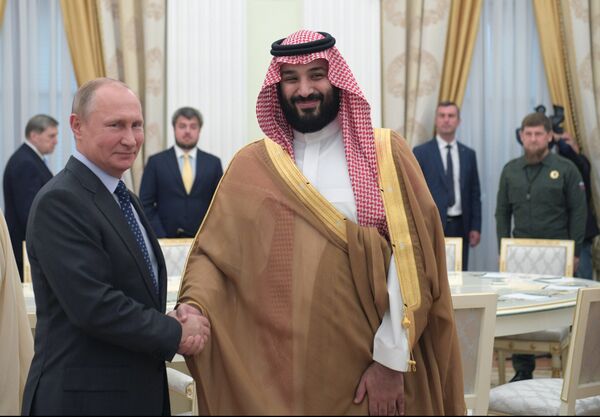
We believe that this council will provide a fresh impetus to Russia-Saudi ties in 2020. We are planning the next meeting of the council in St. Petersburg during the economic forum.
Our $7 billion partnership with sovereign wealth fund Mubadala from UAE is a major source of investments for the Russian economy. To date Mubadala has invested and approved for investment over $2 billion in 45 projects in such sectors as infrastructure, technology, mining, financial services, logistics, retail, among others.
During Vladimir Putin’s visit to the UAE we announced 10 new agreements exceeding $1.3 billion. The joint mission of the first UAE astronaut and Russian cosmonauts to the International Space Station aboard a Russian spacecraft this year was a symbolic event that heralded more cooperation in space and other areas. Many people across the Middle East were glued to TV screens that night to watch an Arab astronaut go into space.
RDIF is also working to help Russian companies to enter Saudi and UAE markets. About 10 companies are looking into projects in Saudi Arabia, especially the petrochemicals sector, communal services, transport, and technology.
Sputnik: What are your plans for developing a partnership with China?
Kirill Dmitriev: The Russia-China Investment Fund (RCIF) together with partners invested more than $7 billion in 35 projects. Currently, RCIF is the main vehicle for Russia-Chinese investment. The heads of Russia and China have agreed to inject another $3 billion into RCIF. Work is underway to increase RCIF's capital to $5 dollars. This year we made some new investments, including in such companies as Intergeo, which will develop major metal deposits used in electric batteries in Siberia, and Alium, the new leader in the Russian pharmaceutical sector.
We continue to work with our Chinese partners to set up funds for transactions in yuan, including a fund with the China Development Bank for an equivalent of $10 billion. RDIF also launched the first partnership with Guangdong Utrust Investment Holdings, the regional fund of Guangdong Province with a population of over 110 million people.
RCIF and Chinese company Tus-Holdings established a venture fund with a capital of $100 million and focus on investment opportunities among Russian high-technology companies and startups, with a potential for their later development on the Chinese market.
Sputnik: What is the significance of your partnership with Alibaba and other technology firms?
Kirill Dmitriev: For us it was very important to close the deal between Alibaba, Megafon, and Mail.ru to create Aliexpress Russia. It is an example of our cooperation with a powerful international player in technology that stands in the same category as such giants as Amazon, Google, and Microsoft.
Alibaba was at the very heart of China’s technology and business revolution. The creation of Alibaba led to an explosion in the numbers of small enterprises in China as well as rapid development in new technology in logistics and finance. China is the emerging powerhouse in the global technology race and partnerships with such a company as Alibaba can give us expertise and capital to join this race.
There are often calls to build everything ourselves, and obviously, we need to make efforts to do that. But we also need partnerships with such technological leaders as Alibaba.
Such platforms will enable the country's small and medium enterprises to enter Asian markets. Alibaba products are being integrated into Mail.ru products. As a result our consumers will receive high quality products at low prices but also our small and medium businesses will be able to export their products to Asian markets.
Sputnik: What are the other areas of technology you are interested in?
Kirill Dmitriev: We invested in online movie theater ivi.ru together with our partners from Baring Vostok. This sector is developing very rapidly worldwide with companies like Netflix starting their own production and becoming rivals to traditional cinema chains and studios. We think ivi.ru is an absolute leader in this segment in Russia.
We also believe in telemedicine, especially in a country like Russia where many people live in remote areas without regular access to doctors and clinics. We invested in a company called Doctis. It is growing very fast, its growth exceeded our forecasts by 50 percent.
We see that the younger generations is more inclined to first turn to telemedicine and only then to see a doctor in person. We see that this is also a very promising area for investment.
Sputnik: What is so attractive about investment in Russia?
Kirill Dmitriev: The returns we provide for our investors are very attractive and higher than indexes in most other countries. Our portfolio companies’ revenue grew by 13% in the first half of this year. That is much faster than the growth of the economies of Russia, China, and many other countries. We invest in growing companies and help them to grow even faster.
This year we have also done some successful exits from a number of portfolio companies. We have partially exited our investment in the Moscow Stock Exchange, gold miner Polyus Gold, and retail chain Detsky Mir, providing very substantial returns for our partners.
We are also planning to exit such project as the elimination of digital inequality and smart grids; the first project we did with together with Rostelecom. As a result, over 10,000 Russian towns have been connected to high speed internet.
Many of our partners have done dozens of deals with us. Some companies we have created from scratch. For example, this year we have continued to invest in one of Russia’s leading logistical operator PLT. This company was created from scratch, it did not exist 3 years ago. Now it is one of the top 4 logistical operators. Next year we are planning to increase the volumes of processed goods by 50 percent. This is a good example of cooperation: high quality logistics comes to the region while investors receive attractive returns.
Sputnik: What are your forecasts and plans for 2020?
Kirill Dmitriev: We believe that the growth of the Russian economy this year will exceed the official forecast to stand at 1.5-1.7 percent. It is not bad, compared with some other countries. Russia is catching up with Germany and is on its way to becoming the world’s fifth largest economy. Germany will grow by only about 0.5 percent this year.
However, macroeconomic stability alone is not sufficient for future growth. We believe that higher growth rates can be achieved only through large-scale investments. Such investments cannot be enforced upon companies. We can see that in sectors where such conditions were created investment is growing, agriculture being a good example.
Conditions for attractive returns should be created in various sectors of the economy. We believe that the government can play a crucial role here, investing the money from the National Welfare Fund to complement private investment.
We believe that the government should also invest in infrastructure through a special fund. The state can invest 10-20 percent while the rest can come from private investors. The state will receive its money back though taxes generated by these projects. We believe that such mechanisms are needed to achieve higher growth. It is difficult to move forward without the growth of the economy.
We've already invested in a number of projects where the state had partially financed the infrastructure around the project. We see that if the state did not invest in infrastructure, these projects would not have happened. Therefore, jobs and tax revenues would not have happened.
We have invested in a number of projects that required substantial infrastructure support from the government such as Moscow’s Circle Road, a major project that will drastically improve the transport situation in central Russia.
Sputnik: Are RDIF's foreign partners interested in national projects?
Kirill Dmitriev: Russia's national projects are the most ambitious transformation programmes in the world. This programme offers tremendous opportunities for investors. Many of our partners participated in similar transformation programmes in their own countries and know well the scale of opportunities.
Some of our partners, for example, sovereign wealth funds from the United Arab Emirates (UAE), a country that demonstrated impressive results after transforming, can bring expertise which can be used during the implementation of national projects.
RDIF's partners from China, Japan, Saudi Arabia, UAE, Italy, France, Turkey, and other countries have expressed genuine interest in national projects. The leadership of Saudi Arabia is carrying out its own transformation programme Vision 2030. We see the potential for synergies and exchange of expertise between Saudi and Russian governmental institutions and companies.
We analysed over 600 projects as part of our work with the government and found a way to replace over 30 percent of the government funding with private capital. The participation of private investors will make projects more efficient and transparent.
We see especially large potential in healthcare. We have invested in building two world-class oncological treatment centres in the Moscow Region and are planning to turn them into a nationwide network in the future. The first two centres can carry out up to 50,000 tests per year and provide the most effective and modern treatment for 5,000 patients. It shows that projects like this can be implemented using private funds.
Sputnik: This autumn a significant event took place: the first agreement to be signed between RDIF and a foreign partner, Saudi Arabia, for the joint development of AI technologies. How strategically important is this partnership in jointly developing AI? What is your prognosis and what are your plans for this new high-tech development?
Kirill Dmitriev: We think that AI can make some sectors more efficient by 20 to 40 percent. Companies that begin using AI technologies see this effect immediately. AI is not something very theoretical, on the contrary, it is very practical.
Leading Russian companies, including RDIF, Sberbank, Gazpromneft, Yandex, Mail.ru and MTS, have created to an alliance to develop AI technologies. RDIF signed an agreement with the Russian government this year to develop AI projects in Russia. This agreement made RDIF a key institution responsible for developing AI in Russia, for bringing foreign investment and expertise into this sector and helping Russian companies to enter the global market. We are already helping our portfolio companies working in the field of AI to become more international.
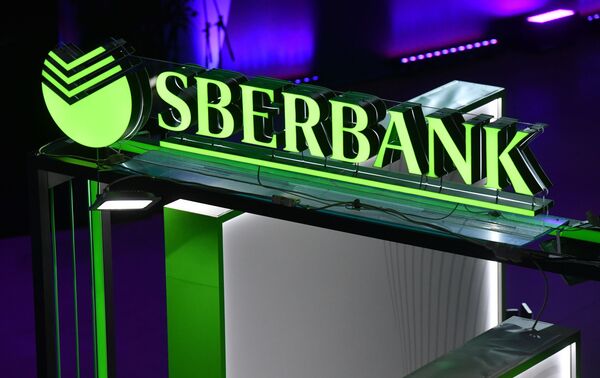
For example, we invested in a company called Motorica that makes advanced artificial limbs with the use of AI technology. Their limbs can “feel” thanks to special sensors implanted under the skin. Thanks to our partnership, Motorica will now be exploring international markets, including the Middle East and Asia.
Face recognition technology, developed in Russia, also has a lot of potential in international markets. Together with our Middle Eastern partners we are looking at NtechLab, who designed security systems during the World Cup. Now we are taking this company to Middle Eastern markets where we see many opportunities for technologies, developed by NtechLab.
There is a similar story with the company called Scanex that had developed a technology to improve the quality of satellite images in order to obtain more detailed data for analysis powered by AI. The company has some unique products such as agricultural lands monitoring tools, which can be very successful worldwide. RDIF is looking at the company together with our partners from the Middle East. This partnership has opened up regional Middle Eastern markets for Scanex.
We are also encouraging all our portfolio companies to invest in AI. For example, in the oncology treatment centres I mentioned earlier RDIF helped to launch a pilot project using AI to detect tumors with a 5-6 time higher precision rate than a human doctor.
We believe that the implementation of AI technology in healthcare makes the sector much more efficient. We invested in Russia’s first surgical robot and think that AI in healthcare as a well as in many other sectors has a huge potential.

